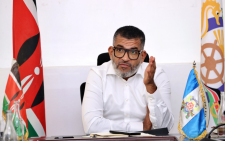COP30’s host Brazil on trial in fossil fuel phase-out row

The mid-year climate talks opened in Bonn, Germany, on June 17, 2025, as the 2025 UN Climate Conference (COP30) host, Brazil, was put on the dock over its position on fossil fuels.
Discussions in Bonn could be smooth, considering that the US, whose climate-sceptic President Donald Trump has already announced his intention to walk out of the Paris Agreement, is not expected to attend.
The US is, however, still a member of the UN Framework Climate Change Convention (UNFCCC), the scientific institution legally binding all nations, which underpins global action to tackle climate change.
Contentious agenda topics in Bonn include how to measure adaptation success and pursue a just transition away from fossil fuels in energy systems, and the omnipresent issue of climate finance.
Since COP28 in Dubai, UAE, oil-dependent states such as Saudi Arabia have played down the significance of what they and other countries agreed on and opposed any further discussions of fossil fuels at COP29.
Brazil’s COP30 team have said they want fossil fuel phase-out back on the agenda, but – like many others – their government’s moral authority on the issue is weak, says the authoritative UK-based Climate Home News digital publication’s news editor Joe Lo.
“On Tuesday – in timing that couldn’t be worse if it tried – the Brazilian government will auction off 172 oil and gas blocks, some of which are close to the mouth of the Amazon river and Belém, the COP30 host city. There is no leadership without coherence, warned 350.org’s Latin America managing director, Ilin Zugman,” Lo added.
Cross-purposes
A new report by the International Institute for Sustainable Development (IISD) says that 85 per cent of Brazilian state-controlled oil company Petrobras’ extraction would be unprofitable if global warming is limited to 1.5 degrees Celsius.
So, while Brazil’s climate diplomats promote “Mission 1.5” in Bonn, their colleagues back in Brasilia seem to be betting on mission failure, he says.
Brazil’s lead climate diplomat Lilian Chagas has said she is seeking “real advances in the Bonn sessions” on the Just Transition Work Programme (JTWP) and recommendations from the 2023 Global Stocktake (GST) for the decisions to adopt them to be adopted at COP30 in Belém.
The JTWP is a series of dialogues on how to make the transition to a greener world fair, while the GST discussions focus on how the world’s governments should respond to being collectively off-track to meet their goal of limiting global warming to 1.5°C above pre-industrial levels adopted in the 2015 Paris Agreement.
A key point of debate at the Bonn climate conference is the wording around fossil fuel phase-out, with some proposing a shift from phasing out fossil fuels to phasing out “fossil fuel emissions”.
Other issues include updating national climate plans, addressing financing for climate action, and ensuring a just transition that considers the needs of vulnerable groups.
The conference is attempting to clarify and operationalise the COP28 agreement to transition away from fossil fuels. This includes discussions on ending new fossil fuel exploration and licensing, and potentially phasing out government subsidies.
That’s why climate activists and extreme climate-vulnerable countries expect the Bonn talks to make progress on fossil fuels, because ambitious climate plans are needed to implement fossil fuel phase-out.
Negotiators and governments in Bonn, a major stepping stone to COP30 in Brazil, have an important opportunity to place the fossil fuel phase-out at the heart of global climate action. According to Human Rights Watch senior advocate, environment and human rights, Myrto Tilianaki.
Despite the historic commitment at COP28 to transition away from fossil fuels, COP29 in Baku, Azerbaijan, delivered no meaningful progress. Meanwhile, several governments are planning to increase fossil fuel production, supported by ongoing subsidies, notes Tilianaki:
“Fossil fuels remain the primary driver of the climate crisis, responsible for over 80 per cent of global carbon dioxide emissions. Human Rights Watch has documented how communities living near coal, oil, and gas infrastructure bear the brunt of the health, environmental, and human rights harms caused by fossil fuel production.”
Tilianaki urges the Bonn conference to lay the groundwork for the transition away from fossil fuels with a clear, time-bound framework. This year, countries are expected to submit updated national climate plans outlining how they will reduce greenhouse gas (GHG) emissions, which are mainly caused by fossil fuels, through 2035.
Many countries have not submitted updated plans, and many of those submitted so far fall short of aligning with limiting global temperatures to 1.5 °C.
“Governments should use the Bonn talks to commit to ambitious climate plans that set out concrete milestones, such as ending new fossil fuel exploration and licensing, phasing out government subsidies, and ensuring adequate monitoring and accountability”.
Tilianaki says Bonn is also a moment to fill a serious gap. The COP28 commitment to transition away from fossil fuels has not yet been incorporated into the COP30 agenda.
Bold action
“Brazil’s recent call for countries to show how they plan to implement the COP28 commitment should be followed by efforts to ensure this issue is front and centre in Belém. As the COP30 host, Brazil has a responsibility to lead,” Tilianaki argues, adding that governments meeting in Bonn should commit to ambitious national plans and a fossil fuel phase-out.
“Without bold action now, COP30 risks falling short on delivering a credible response to the climate crisis”.
In its defence to its prosecutors on the just transition and fossil fuel phase-out debate, Brazil is credited with having the world’s third largest increase in both wind and solar generation, with an 80 per cent share of low-carbon electricity, 24 per cent of solar and wind and 10 per cent share of electricity from fossil fuels.
About 90 per cent of Brazil’s electricity was generated from low-carbon sources in 2024, above the global average of 41 per cent. It was the 6th largest country by electricity demand.
Brazil’s largest source of clean electricity is hydro (56 per cent). Its share of wind and solar (24 per cent) is above the global average (15 per cent) – higher than some regional peers such as Argentina (14 per cent), but lower than others such as Chile (34 per cent).
Brazil relied on fossil fuels for just 10 per cent of its electricity in 2024. Its power sector emissions per capita were the lowest in the G20 and a fifth of the global average.
Brazil’s power sector emissions peaked in 2014, as growth in wind and solar has more than met rising demand. Fossil fuel generation in 2024 was almost 50 per cent lower than a decade ago.
In the same timeframe, the share of wind and solar generation rose from 2 per cent in 2014 to 24 per cent in 2024.
Brazil is a leader in renewable electricity within the G20 and has already exceeded its goal of generating 64 per cent of its electricity from renewable sources by 2030.
“Latin American countries are at the forefront of renewable electricity generation,” observes Wilmar Suarez, an analyst at global energy think tank Ember.
“Brazil is among those showing that investing in solar and wind energy offers enormous socioeconomic benefits, providing affordable electricity to citizens, creating multiple opportunities for new green jobs and strengthening their energy security”.












